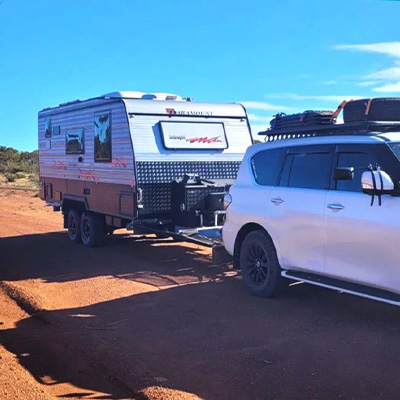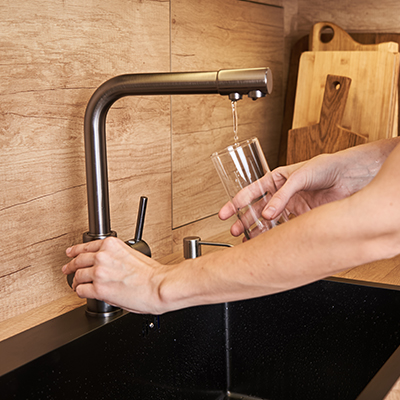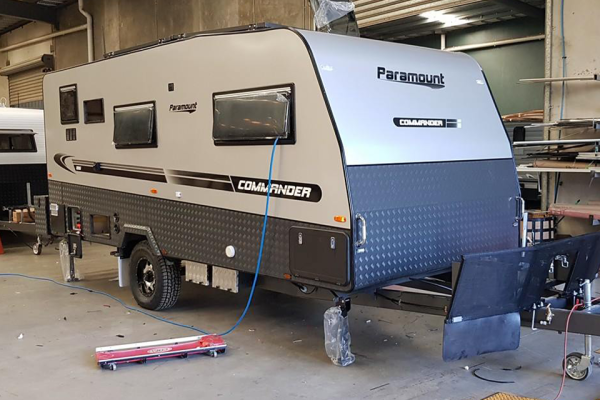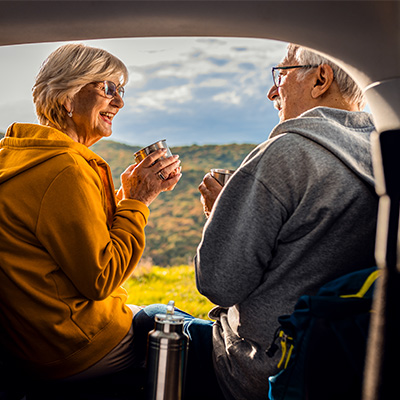
There’s nothing like the anticipation of buying a caravan and thinking of all the adventures ahead. Caravanning allows you to explore and experience the great Australian landscape with a life on the road on your terms. Whether for family holidays or a bucket list dream, buying a caravan opens up a world of opportunities, but it is not a decision to make lightly. Apart from the financial commitment, there is a vast variety of styles, sizes, construction materials and layouts to choose from. It is essential to do your research to find the ideal caravan to buy. We guide you through everything you need to know about buying a caravan, what to consider when choosing, types of caravans and their features to help in your quest to buy the ideal caravan.
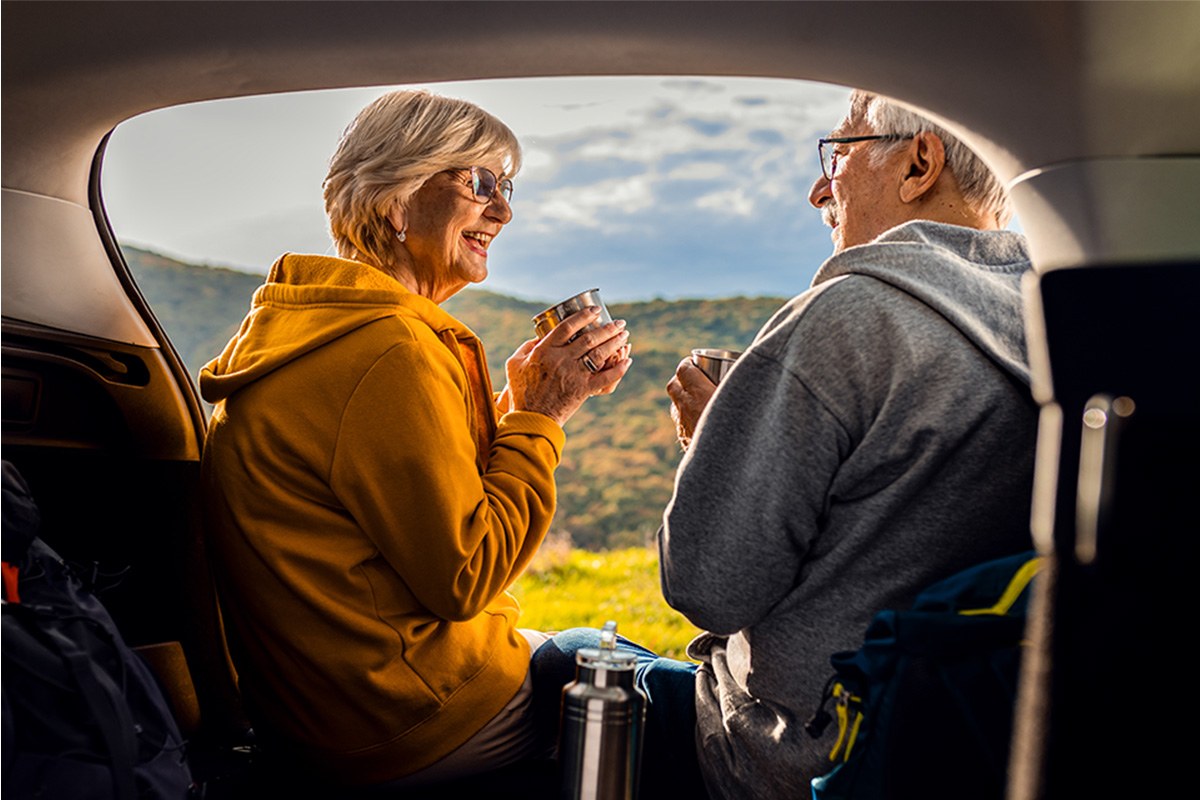
What to Consider When Buying a Caravan
Understanding your needs is essential for deciding which caravan to buy. Every person and situation differs, from budget to personal taste, reason for travelling, and travelling companions. Caravans come in all shapes, sizes and construction materials including aluminium, PVC and timber. They have different layouts, and are available in pop tops or full height. To determine which caravan to buy, you must consider your needs and the types of caravans available, their features and extras.
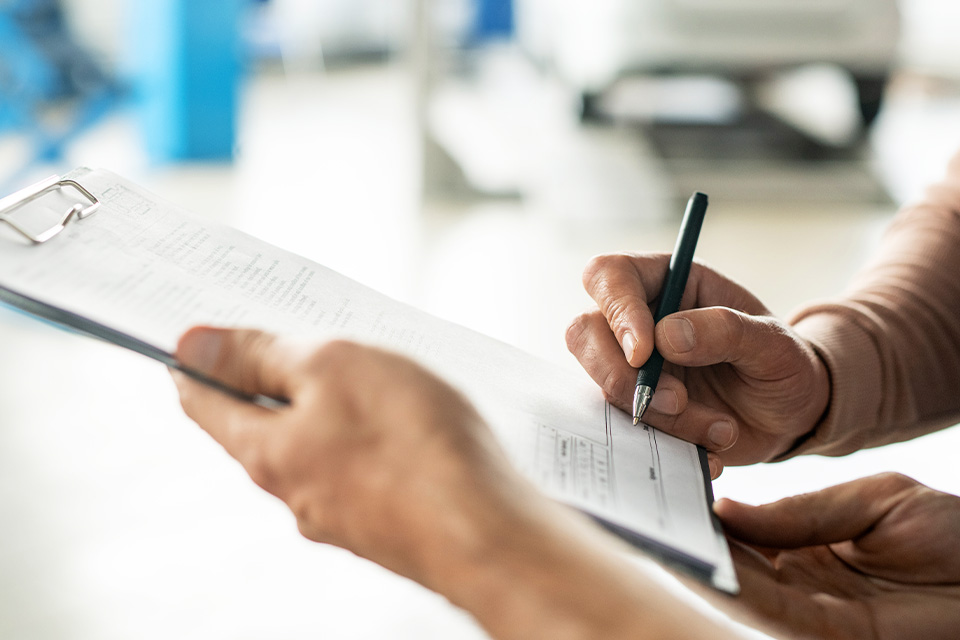
Assessing Your Needs
The first step to finding the right caravan to buy is assessing your individual needs. Taking these factors into account is an effective way to identify the practical considerations of purchasing a caravan:
- Understand your budget. Before looking at your ideal caravan, it is crucial to examine your budget realistically. This will help you avoid the pitfalls of focusing on caravans outside your price range and the temptation to overspend. When considering how much you can afford to spend, take into account your current finances, future plans, and the additional costs that come with owning a caravan, like insurance, fuel, registration, maintenance, and servicing. Considering caravan prices range from around $50,000 to $120,000, this significant investment may require outside financing. Make sure you do plenty of research to find the right finance company and examine your repayment ability pragmatically. One way to finance a caravan is through a financial company or you can look into property equity.
- Your towing vehicle. You might be buying a caravan to suit an existing tow vehicle or choosing a towing vehicle for the type of van you are buying. Either way, there are extremely strict regulations regarding towing weights and what vehicle can legally tow a caravan. Each car has its towing capability, so it is essential to understand the vehicle’s towing capacity and the caravan’s weight.
- Consider Your Towing Experience. How comfortable you feel when towing a caravan might impact the size of the caravan you choose. If you have limited or no towing experience, towing a large van might seem daunting. When towing a caravan, you need specific skills not required for driving a car. These include the ability to manoeuvre, reverse and park a large, heavy caravan, reduce caravan swaying, understand caravan safety and your vehicle’s limits, allow for extra braking distance, and adequately secure the weight. Ultimately, it is all about ensuring you get to your destination safely. If you don’t have towing experience, there are courses in every state that teach you caravan towing skills.
- Where the Caravan is Being Towed. Considering where you are towing the caravan and how it will be used will significantly impact the type of caravan you need. Do you plan to stay on bitumen roads, or will your adventures be on corrugated roads? For the latter, you must look at a caravan with high-quality suspension, larger wheels and ground clearance.
- The amount of time on the road. The type of caravan you choose will also depend on how long you plan to be on the road. If you are doing weekend trips, a smaller caravan will probably suffice as it will be easier to hitch up and tow than a larger van. For unlimited adventures, where time on the road is likely extensive, you will want a caravan with plenty of comfort features like a bathroom, decent-sized kitchen and ample storage space. You also want to ensure you have the correct water tanks on long trips. If you wish to make a caravan off-grid, you will need to consider additional extras such as solar panels.
- Where to store it – at home. When the caravan is not being used, it needs to be considered where you can store it. If you are storing the caravan at home, there must be sufficient space, either in a garage, carport, shed or outside on the driveway or property. Where it will be stored will impact the size of the caravan you buy.
- Where to park it on the road. Think about where you plan to park the caravan, and its impact on the type you buy. Will the caravan be parked in a caravan park, on the side of the road, or in a remote area off the beaten track? Some caravan parks cannot accommodate larger-style caravans. If you plan to park outside designated caravan parks, check with councils to find out where you can park legally.
- Family needs. The family’s needs will be paramount when choosing a caravan to buy. You need to consider how many people will need to fit into the caravan, their ages and requirements, how many beds you will need, the amount of storage, and bathroom requirements. These factors will affect the type of caravan and layout for a comfortable family holiday.
- Accessibility needs. If you or a family member is wheelchair bound or has accessibility needs, it is important to consider the accessibility of a caravan. Look at things like if there is enough room for a wheelchair to access the caravan, manoeuvre around the interior, and utilise all the amenities.
- Amount of Maintenance Required. All caravans need maintenance, and it is essential to consider the time and cost of maintaining and servicing a caravan when considering a caravan purchase. Caravans must be looked after to run well, which means regular mechanical servicing by a professional. You can do many things yourself, like checking tyres and seals and keeping the van clean. If you buy a van with water tanks, remember they need regular maintenance, particularly the water tanks for the bathroom, which have toilet cassettes that need to be emptied.
Types of Caravans
Once you have assessed your needs and understand your budget and requirements, it is time to look at the types of caravans available to buy.
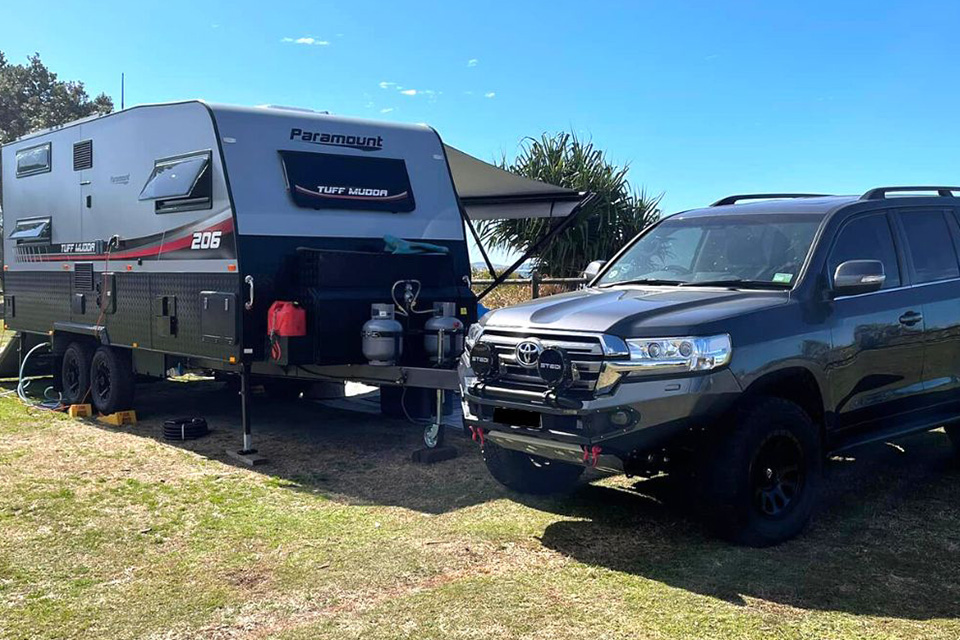
- Family. A family caravan can be any caravan that has all the features a family needs. It will have enough beds for each family member, enough room for storage, a bathroom if required, and enough kitchen space to cook meals for everyone. A family caravan can be small, medium or large depending on the number of people travelling.
- Two-person. A caravan for two people is usually lightweight and compact, so it is easy to tow and drive. It usually has two single beds or a large double bed. Two people can also opt for a larger caravan for maximum comfort and space.
- Single/solo. Small, compact caravans are usually ideal for solo travellers. These caravans have the features of larger vans but a more compact layout. Solo caravans have a bed, kitchen, bathroom if required, and storage area.
- Off the bitumen road. Plenty of caravans can be taken off a bitumen road. Still, most specifically designed for this will have features like superior suspension, and heavy-duty construction materials.
- Touring. These types of caravans are designed for well-maintained roads only. They often weigh less than other caravans and are ideal for long road trips or short weekenders, provided the driving is on bitumen roads. These types of vans are usually lightweight and more straightforward to tow.
- Static. A static caravan is kept in a caravan park or on a property and does not move. It is transported there and left to be used to live in for an extended time. Because they are stationary, static caravans can have more home comforts like double-glazed windows, fully equipped kitchens and bathrooms, and even central heating.
- Hybrid. A hybrid caravan is a cross between a caravan and a camper trailer. While it has a hard shell like a caravan, it has suspension more like a camper trailer, which means it can be taken off a bitumen road. Hybrid caravans tend to be relatively small and more suited to outdoor living.
- New or used. Many new and used caravans are available, and deciding to buy a new or used comes down mainly to price. A used caravan is an excellent way to enter the caravan market when on a tight budget. You can buy used caravans online and at caravan dealerships. However, buying a brand-new caravan will guarantee a fresh, new product with no wear and tear. You also have the benefit of a warranty.
- Pop-top. This caravan is like a full-height caravan but has an expandable roof. It is usually smaller and more accessible to tow and will fit into a low garage or carport better than its full-height counterparts. Pop-top caravans are suitable for solo travellers, couples and small families.
Caravan Features and Extras
Another consideration when buying a caravan is the type of features and extras available. Caravans come in all shapes and sizes, with different sleeping arrangements and living layouts. Each type of caravan weight differs, and some come with extras like solar panels and batteries. Comprehending the features and extras available will help you decide on the right caravan.
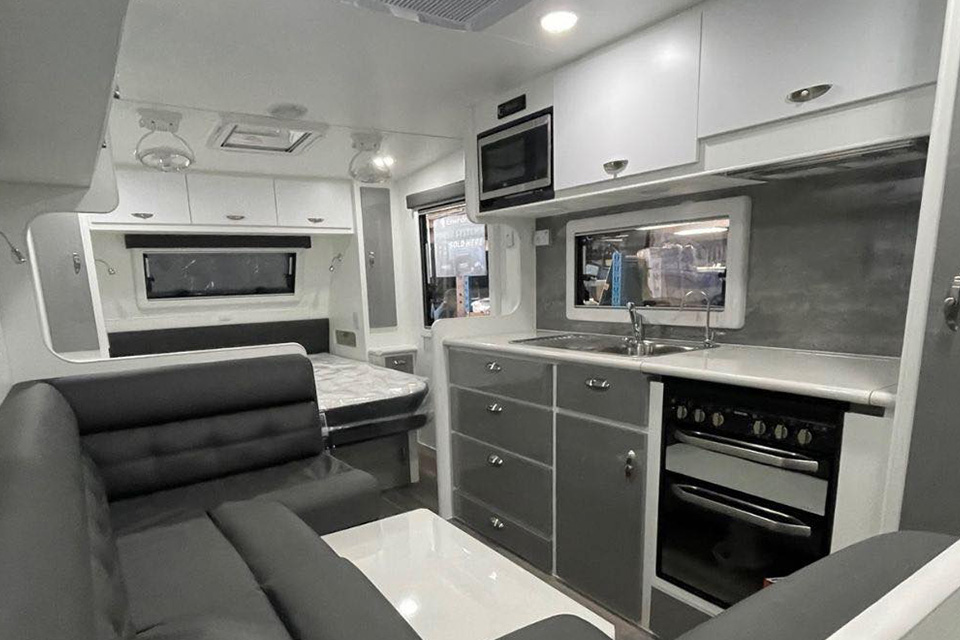
- Caravan Weight. One of the most basic yet confusing things that caravanners face when buying a caravan is understanding the weights specified by the caravan manufacturer. Understanding what they mean and how they relate to the tow vehicle is very important. The caravan weight is measured to assess load capability and what type of vehicle can tow it. Their measurements are vehicle tare weight, kerb weight, gross vehicle mass, caravan tare weight, gross trailer mass, aggregate trailer mass, gross combination mass, tow ball weight, and payload.
- Caravan Size. Size is important as it will determine how many people it can accommodate, how comfortable it is to live in and tow, and where you can park it. Caravans range in length from 3.3 metres to 7.9 metres, and the size affects how easy it is to drive, given that larger caravans tend to be more challenging. The size of the caravan has a significant impact on the overall caravanning experience and needs to be considered carefully when deciding which caravan to buy.
- Caravan Layout. Choosing the right floor plan for your caravan is essential for comfortable and practical living. Caravan layouts are more diverse these days, offering a lot more choices. Choosing the suitable caravan layout depends on personal taste, how you will use the caravan, and the caravan size. A typical caravan layout includes beds, a bathroom, a dinette, and a kitchen.-Beds: The initial decision usually focuses on the beds, where they will be placed and how many. Most caravans have between two and six beds, and there is a choice of whether to have the beds fixed or convertible. A fixed bed might be a double bed at one end, while the other beds are most likely not fixed and easily converted to dining and living zones. The most popular fixed double bed layout comprises a double bed fitted to one side of the caravan called a French Bed, with a corner slightly cut off for a small bathroom. Families usually choose fixed bunk layouts or single convertible beds.
- Washroom: Most caravans have washrooms, usually located at the end of the caravan, for privacy and to allow space for a shower.
- Kitchen: Typically, the kitchen is located in the centre of the caravan, but some caravans have kitchens at one end. A kitchen in the centre offers more stability for towing and is the most sensible for heavy items like stoves and sinks. An end kitchen is only suitable for small caravans and should not be placed at the front of the caravan as it will add nose weight (a downward force from the caravan’s hitch to the car’s tow ball) when being towed.
- Dinette: These dining areas are at one end of the caravan, usually the front and can be fixed or converted to beds. Dinettes usually have two couch-like seats on either side or a U-shaped couch and a central dining table.
- Caravan Construction. The materials used to construct your caravan will contribute to its aesthetics and impact functionality and performance over time. Caravan construction affects fuel efficiency, maintenance and durability, so it is essential to determine what materials are best suited to the type of caravan you want to buy. The materials your caravan is constructed from include meranti, celuka, aluminium, and fibreglass, and there are also two different construction methods to choose from which will impact which caravan you buy.
- Heating/Cooling. Remember to shop around when considering heating and cooling for a caravan, as a few different systems are available. Choosing the right caravan air conditioner means considering the caravan’s size, where you will be travelling, price, and brand. Depending on the type of caravan, air conditioners can be mounted on the roof or built-in. Regarding heating, choices include electric, gas or diesel, each with pros and cons. Consider your budget, caravan size, and heating requirements when looking at heating options.
- Water Tanks. Caravans have three possible water tanks: freshwater, greywater, and blackwater. Each has its own uses, and some caravans have all three. When considering buying a caravan with water tanks, it is essential to understand the uses for each. All caravans have freshwater tanks used for drinking, sinks, and showers. Greywater tanks collect the dirty water used in sinks and showers, while blackwater tanks collect and contain human waste from the toilet.
- Ensuite. Thinking about buying a caravan with an ensuite is important, as many new caravans have ensuites as an option. Ensuites are convenient, private, comfortable, and a modern convenience to be enjoyed on the road. If you do choose a caravan with an ensuite, it will be more expensive, and it will take up some space. You will also need greywater and blackwater tanks.
- Off-the-grid features. If you plan on having a self-sufficient caravan, you must look at off-grid features that allow disconnection from conventional grid systems. These features include installing solar panels, water storage tanks, fresh water filtration systems, and lithium battery systems.
- Optional extras. There are a number of optional extras available like bike racks, tool boxes, extra water tanks, towing mirrors, reversing cameras and generators to name a few. Before you purchase a caravan, consider any optional extras and remember to take into account each will take up more space, add weight, and cost more to install.
Ownership Preparation
Buying a new caravan is an exciting time. You have done all your research and have a good idea of the type of caravan you want to buy. Follow these tips to prepare you for this new adventure as a caravan owner.
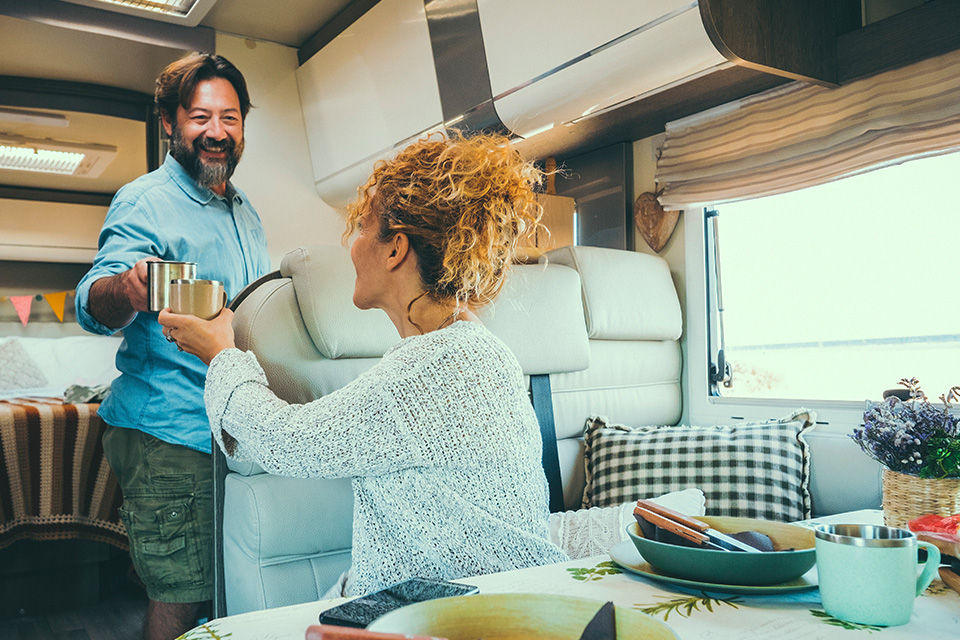
- Before purchasing, do a thorough inspection of the caravan. Make sure that everything works. Check things like the lights, gas, and charging points. If you have any added accessories, ensure they are working and properly installed. Check the caravan’s body and interior to ensure there are no new dents or scratches. Do a test tow by asking the caravan owner or distributor to take it for a run. This way, you will see how it works, what it is like to tow and how well the caravan runs. If you are buying a second-hand caravan, do a Personal Property Security Register (PPSR) test. This is a national online register that helps protect consumers when buying personal items like caravans. A PPSR test will give a full history report and check if the caravan has been written off, stolen, or covered by finance.
- Before handover day, ensure your tow vehicle is fully set up and will handle the caravan’s weight. Legally, most caravans require the towing vehicle to have electric brakes so make sure your car is fitted with an electric brake controller. Make sure the trailer connection plug is fitted to the vehicle and you have adequate towing mirrors.
- Have caravan insurance organised. Either organise a cover note on the day or organise insurance in advance to protect your new asset. To find the best insurance for your needs, consider key factors such as the type of coverage, the caravan’s intended use, the driver’s age and experience, the excess amount and the contents in the van.
- Organise registration and a roadworthy certificate. To register a caravan, you need to get a certificate of roadworthiness, which shows the caravan is safe enough to be on public roads. All caravans must be registered and roadworthy to be towed on the road.
- When picking up the caravan, ask the salesperson again to show you all its features and how to set it up. Ensure you know how to hitch the caravan to the tow vehicle and prepare a setup and pack-down checklist to follow when you start out.
Buying a caravan is a milestone to savour in life but also a big decision. It has financial and personal implications and is not to be taken lightly. Our comprehensive guide explains everything you need to consider about buying a caravan and starting an exciting chapter in your journey. The experts at Paramount Caravans are available to answer any of your questions on buying a caravan.
